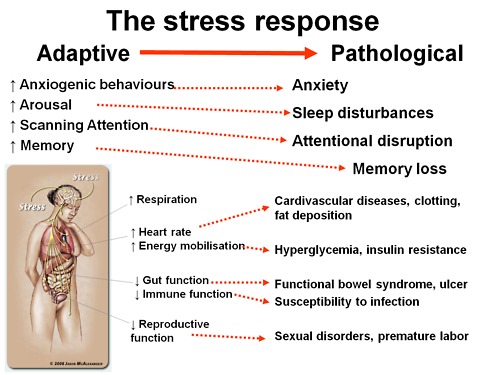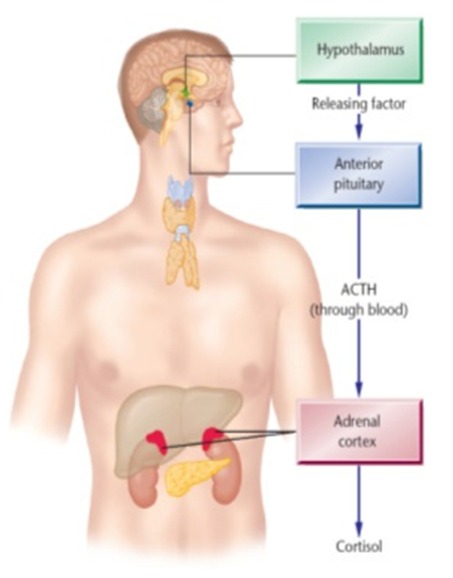
This is just a powerpoint slide I plucked from a previous lecture - credit for the pic goes to Dr M.C.Pardon of the Uni. of Nottingham Medical School (QMC), who does research on stress & neurodegenerative disease.
Adaptive responses to stress are generally more short term and they are usually quite good for you. As a result, one can conclude that some stress is actually good for you. However, too much stress leads to pathological responses which are bad.

Stress responses of the body are mediated by the hypothalamus. The hypothalamus releases a hormone called CRH (corticotropin releasing hormone) into the median eminence, which transports the hormone via the blood to the anterior pituitary. Cells of the anterior pituitary then release ACTH (adrenocorticotrophin releasing hormone) into the blood supply which circulates to the Adrenal glands (which sit on your kidneys like little hats). The adrenals are responsible for releasing all kinds of steroid hormones, but in this context, it’s cortisol they’re releasing. If you want to be all savvy and smart about it, then you cansay that the stress hormone, cortisol, is released by the Zona Fasiculata of the Adrenal Cortex in response to ACTH. Cortisol is a derivative of cholesterol. All steroid hormones are derivatives of cholesterol, for that matter. Examples of steroid hormones are Oestrogens, Testosterone, Progesterone and Aldosterone. As we can see from that non-exhaustive list, cholesterol has a pretty important role to play in your sexuality, sex life, and reproduction.

Examples of Steroid hormones.
Cortisol is the hormone which causes the majority of the bodily changes associated with stress. Most of the effects described in that first picture are the results of cortisol. Stress, through the action of cortisol, leads to the breakdown of energy reserves. This is why prolonged stress leads to weight loss. Evolutionarily, this would have been advantageous as a typical stress response would have been something along the lines of a sabre-toothed cat or lion raiding the camp, and mobilising energy stores would have got you all alert and ready to take on the threat. To continue along this vein, stress downregulates the action of the amygdala (the fear centre), which gives a reason why you might be a little more fearless under stressful situations (such as lion attack). Stress also downregulates the Supraoptic Nucleus of the hypothalamus. This region of the hypothalamus is responsible for releasing Oxytocin. Oxytocin is an important neurohormone involved in social bonding and love. The decreased oxytocin release indicates as to why stressed out people tend to be less sensitive about other people, and more prone to lashing out.

Spongebob Stressedpants.
We must remember that stress doesn’t only arise from life threatening situations such as a lion attack or a Justin Bieber concert. Stress responses arise from many daily activities, and the body is aware of this. When you are sleeping, you are under less stress (or unaware of any stressful situations), so your cortisol levels are very low. But prior to waking (which is determined by your body clock and sleeping routine), your cortisol levels rise by a large amount (around 50%, if you’re interested). This is known as a rheostatic mechanism. The body is changing in anticipation of an event. The body is anticipating the stress of daily life, so is releasing cortisol in advance. The body can then adjust to the daily stresses as they come.
So we can see from the initial diagram that too much stress can lead to heart disease, impotence and possibly diabetes (through the insulin resistance). Cortisol also downregulates the immune system, by decreasing the mobility of white blood cells and stimulating less antibody release. It kind of explains why more people get ill at around exam time. Another reason for excessive illness around exam time is that students are getting less sleep (from all that hard studying, of course!), and sleep is important for giving the immune system a kick. Sleep states release melatonin (the sleep hormone), and melatonin upregulates the immune system.

Melatonin and the immune response. Diagram from ‘Melatonin - a pleiotropic molecule involved in pathophysiological processes following organ transplantation’, J. E. Fildes et al, Immunology.
And to cap off this post, some research done by a Professor of Neurology at the University of Minnesota, called Adnan Qureshi (he totally robbed my surname), indicates the cat owners are less likely to suffer from heart attacks. The reason for this is unclear but a couple of theories are that cat owners have personality traits which may protect them from heart attacks, or it may well be the soothing, stress relieving feeling of stroking and looking after the cat that reduces cortisol levels. I’m not sure, and neither is Prof. Qureshi (that name stealing fiend) - but as a cat lover, this news pleases me.

 wolfraven4 liked this
wolfraven4 liked this  stemlove2013 liked this
stemlove2013 liked this ambamplease liked this
sanddollarsandabaloneshells liked this
biobehaviorism reblogged this from sciencenote
thevincentchong reblogged this from sciencenote
thevincentchong liked this
4cccc liked this
cyberill liked this
 suffocative liked this
suffocative liked this  finnyyboyy reblogged this from sciencenote
finnyyboyy reblogged this from sciencenote toomiez liked this
beardbot liked this
sciencenote reblogged this from captain-nitrogen-blog
plaguedoctorspicy liked this
stallintheunicow liked this
iyatan liked this
dyskrasia liked this
garexthewrex-blog liked this
tjbrandt-blog liked this
captain-nitrogen-blog posted this
- Show more notes